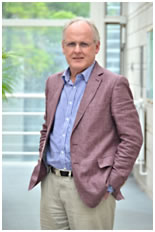 |
||
Accueil > Forum TERATEC > Atelier 4
Forum TERATEC 2016
Atelier 4 - Mercredi 29 juin de 9h00 à 12h30
Architectures de calcul spécialisées : auxiliaires ou challengers ?
The SpiNNaker Project
Abstract : Just two years after the world's first stored program ran its first program at Manchester in 1948, Alan Turing published his seminal paper on "Computing Machinery and Intelligence". The paper opens with the words: I propose to consider the question, "Can machines think?". Turing then goes on to explore this question through what he calls "The Imitation Game", but which subsequent generations simply call "The Turing Test”. Despite spectacular progress in the performance and efficiency of machines since Turing's time, we have yet to see any convincing demonstration of a machine that can pass his test. This would have surprised Turing - he believed that all that would be required was more memory. Although cognitive systems are beginning to display impressive environmental awareness, they do not come close to the sort of "thinking" that Turing had in mind. My take on the problems with true artificial intelligence are that we still really haven't worked out what natural intelligence is. Until we do, all discussion of machine intelligence and "the singularity" are specious. Based on this view, we need to return to the source of natural intelligence, the human brain.
The SpiNNaker project has been 18 years in conception and 10 years in construction, but is now ready to contribute to the growing global community (exemplified by the EU Human Brain Project) that is aiming to deploy the vast computing resources now available to us to accelerate our understanding of the brain, with the ultimate goal of understanding the information processing principles at work in natural intelligence. SpiNNaker is a massively-parallel computer system, ultimately to incorporate a million ARM processor cores (the largest machine to date has 500,000 cores) with an innovative lightweight packet-switched communications fabric capable of supporting typical biological connectivity patterns in biological real time
 |
Bio : Steve Furber CBE FRS FREng is ICL Professor of Computer Engineering in the School of Computer Science at the University of Manchester, UK. After completing a BA in mathematics and a PhD in aerodynamics at the University of Cambridge, UK, he spent the 1980s at Acorn Computers, where he was a principal designer of the BBC Microcomputer and the ARM 32-bit RISC microprocessor. Over 75 billion variants of the ARM processor have since been manufactured, powering much of the world's mobile and embedded computing. He moved to the ICL Chair at Manchester in 1990 where he leads research into asynchronous and low-power systems and, more recently, neural systems engineering, where the SpiNNaker project is delivering a computer incorporating a million ARM processors optimised for brain modelling applications. |
Inscrivez-vous dès à présent et obtenez votre badge en cliquant ici
- Le Forum TERATEC est strictement réservé aux professionnels.
- Participation gratuite aux conférences et aux ateliers (sous réserve des places disponibles).
- L'enregistrement en ligne est obligatoire. Le plan Vigipirate étant porté à son niveau le plus élevé, il est obligatoire de s'inscrire en ligne préalablement et de venir muni(e) d'une pièce d'identité pour pouvoir participer au Forum TERATEC.
- Le badge délivré vous donnera accès gracieusement à l'ensemble des évènements du Forum TERATEC
Pour toute autre information concernant les ateliers techniques, prière de contacter :
Jean-Pascal JEGU
Tél : +33 (0)9 70 65 02 10 - Mob.: +33 (0)6 11 44 49 59
jean-pascal.jegu@teratec.fr
Campus TERATEC
2, rue de la Piquetterie
91680 BRUYERES-LE-CHATEL
France